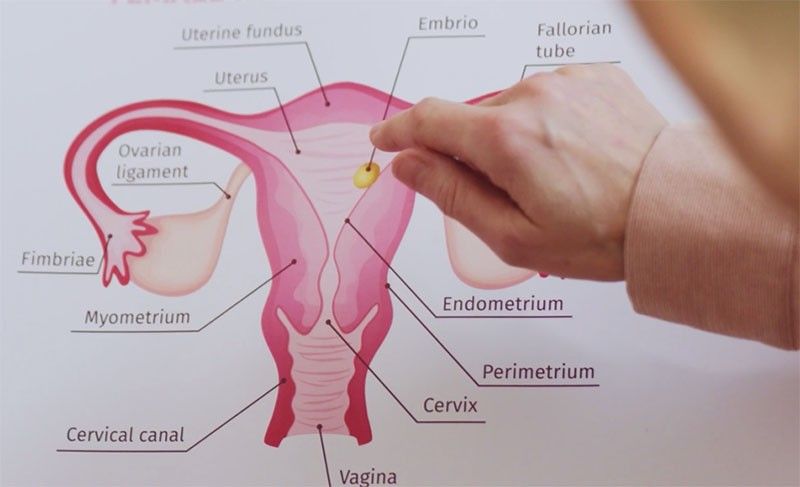#TimeToTalkAboutHPV: The deadly virus that causes cervical cancer


Every year, 7,897 women are diagnosed with cervical cancer and 4,052 of these women die from the disease. Although preventable, many still fail to save themselves from the wrath of cervical cancer -- the 2nd leading cause of death of women in the Philippines.
But imagine if we live in a country where access to every health care service is immediately available. What if we’re given a chance to prevent ourselves from acquiring a disease that causes thousands of deaths?
Thankfully, this is what the Department of Health (DOH), together with medical experts, local government units (LGUs), and private institutions are working on for every Filipino — to protect and save us from a disease that is caused by a single deadly virus -- HPV or Human Papillomavirus.

In one of our Pamilya Talk episodes, Dr. Carmina Alferez, a member of the Philippine Obstetrical and Gynecological Society, defined HPV as a virus that is acquired through skin-to-skin contact during sexual intercourse. Men and women are both vulnerable to it. Dr. Alferez also added that while most cases of HPV are due to sexual transmissions, some can also get the virus through vertical transmission -- a pregnant woman with HPV can infect her baby with the virus.
Symptoms of having HPV are different for men and women. Women experience symptoms such as abnormal bleeding during intercourse, heavier menstruation, and irregular bleeding. Men, on the other hand, usually have genital warts around the penile and anal area as their symptom.
Strong immune systems, at times, can fight off the virus on its own until it naturally dies down in the system. But this may not be the case for all.
At least 14 types of HPV have been found to be cancer-causing. These include anal cancer, penile cancer, and oropharyngeal cancer for men, and vaginal cancer, vulvar cancer, and cervical cancer for women.
According to studies, cervical cancer largely hits women ages 15 to 44 years old. As mentioned earlier, it ranks as the second most prevalent type of cancer among women in the Philippines. Around 99% of its cases are linked to HPV which usually develops in a woman’s cervix (entrance to the uterus from the vagina).
Dr. Alferez clarifies that having HPV does not automatically lead to cancer. But it is important to have early screening done through pap smear to detect pre-cancerous lesions.
Lifesaving HPV vaccinations
The good news is, aside from these screening methods, cervical cancer can be prevented through HPV vaccination. This is why government institutions like the DOH, LGUs, and health care companies like MSD in the Philippines have geared up to fight HPV, through vaccinating the priority ages of 9 to 14 yrs. old. “The earlier we get the vaccine, the better,” Dr. Alferez added.

Kids ages 9 to 14 yrs. old are required to complete the primary series of HPV vaccination that contains 2 vaccines. The second shot is administered 6 to 12 months after the first. On the other hand, 3 doses of HPV vaccines are required for adults ages 15 yrs. old and above. Once the required number of doses of HPV vaccines has been completed, they are enough to protect us for as long we live. Now isn’t that something worth trying to have?
Mayor Arth Marasigan of Sto.Tomas Batangas also graced the show as he proudly presented the school-based immunization program as part of their city’s 12-point program which prioritizes health among citizens.
“Sa aking paglaki, walang HPV” was the latest addition to the school-based immunization program of Sto. Tomas, Batangas that aims to vaccinate students against HPV. This started last November 18, 2022, with Sto. Tomas City in Batangas as the first city to launch this project in their province.
Lifesaving collaborations
Mayor Marasigan stresses the importance of having a multisectoral or multistakeholder collaboration that involves the government and private institutions in putting up health programs that strengthen the health of their community.
As a journalist who have covered several health issues, I have witnessed countless Filipinos dying from different diseases. The truth is, most of them die from a disease that can be largely prevented. But sometimes, they find out too late.
As they say, prevention is better than cure. That’s why I was one of those who took that chance to be vaccinated against HPV! I encourage everyone to also do so because vaccines are truly lifesaving. We do this, not only for ourselves, but for the people we love and want to spend time with.
With the advancement of technology, the dedication of skilled and passionate medical experts, strong support from both LGU and private institutions, and dissemination of accurate health information, Filipinos can start to dream of a country where access to preventable diseases like cervical cancer are just within reach.
---
Watch Pamilya Talk on Facebook, YouTube and Kumu (@JingCastaneda – 12:00 noon – 1:00 p.m. Monday & Wednesday). You can also follow my social media accounts: Instagram, Facebook, YouTube, Tiktok, Twitter and Kumu. Please share your stories or suggest topics at editorial@jingcastaneda.ph.


















